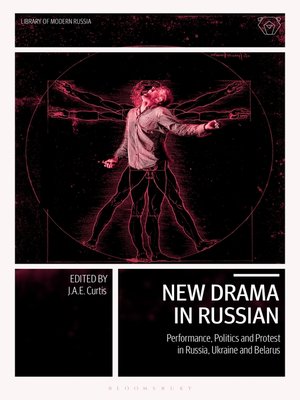New Drama in Russian
ebook ∣ Performance, Politics and Protest in Russia, Ukraine and Belarus · Library of Modern Russia
By J.A.E. Curtis

Sign up to save your library
With an OverDrive account, you can save your favorite libraries for at-a-glance information about availability. Find out more about OverDrive accounts.
Find this title in Libby, the library reading app by OverDrive.



Search for a digital library with this title
Title found at these libraries:
| Library Name | Distance |
|---|---|
| Loading... |
How and why does the stage, and those who perform upon it, play such a significant role in the social makeup of modern Russia, Ukraine and Belarus? In New Drama in Russian, Julie Curtis brings together an international team of leading scholars and practitioners to tackle this complex question.
New Drama, which draws heavily on techniques of documentary and verbatim writing, is a key means of protest in the Russian-speaking world; since the fall of the Soviet Union in 1991, theatres, dramatists, and critics have collaborated in using the genre as a lens through which to explore a wide range of topics from human rights and state oppression to sexuality and racism. Yet surprisingly little has been written on this important theatrical movement. New Drama in Russian rectifies this. Through providing analytical surveys of this outspoken transnational genre alongside case-studies of plays and interviews with playwrights, this volume sheds much-needed light on the key issues of performance, politics, and protest in Russia, Ukraine and Belarus.
Meticulously researched and elegantly argued, this book will be of immense value to scholars of Russian cultural history and post-Soviet literary studies.
New Drama, which draws heavily on techniques of documentary and verbatim writing, is a key means of protest in the Russian-speaking world; since the fall of the Soviet Union in 1991, theatres, dramatists, and critics have collaborated in using the genre as a lens through which to explore a wide range of topics from human rights and state oppression to sexuality and racism. Yet surprisingly little has been written on this important theatrical movement. New Drama in Russian rectifies this. Through providing analytical surveys of this outspoken transnational genre alongside case-studies of plays and interviews with playwrights, this volume sheds much-needed light on the key issues of performance, politics, and protest in Russia, Ukraine and Belarus.
Meticulously researched and elegantly argued, this book will be of immense value to scholars of Russian cultural history and post-Soviet literary studies.







